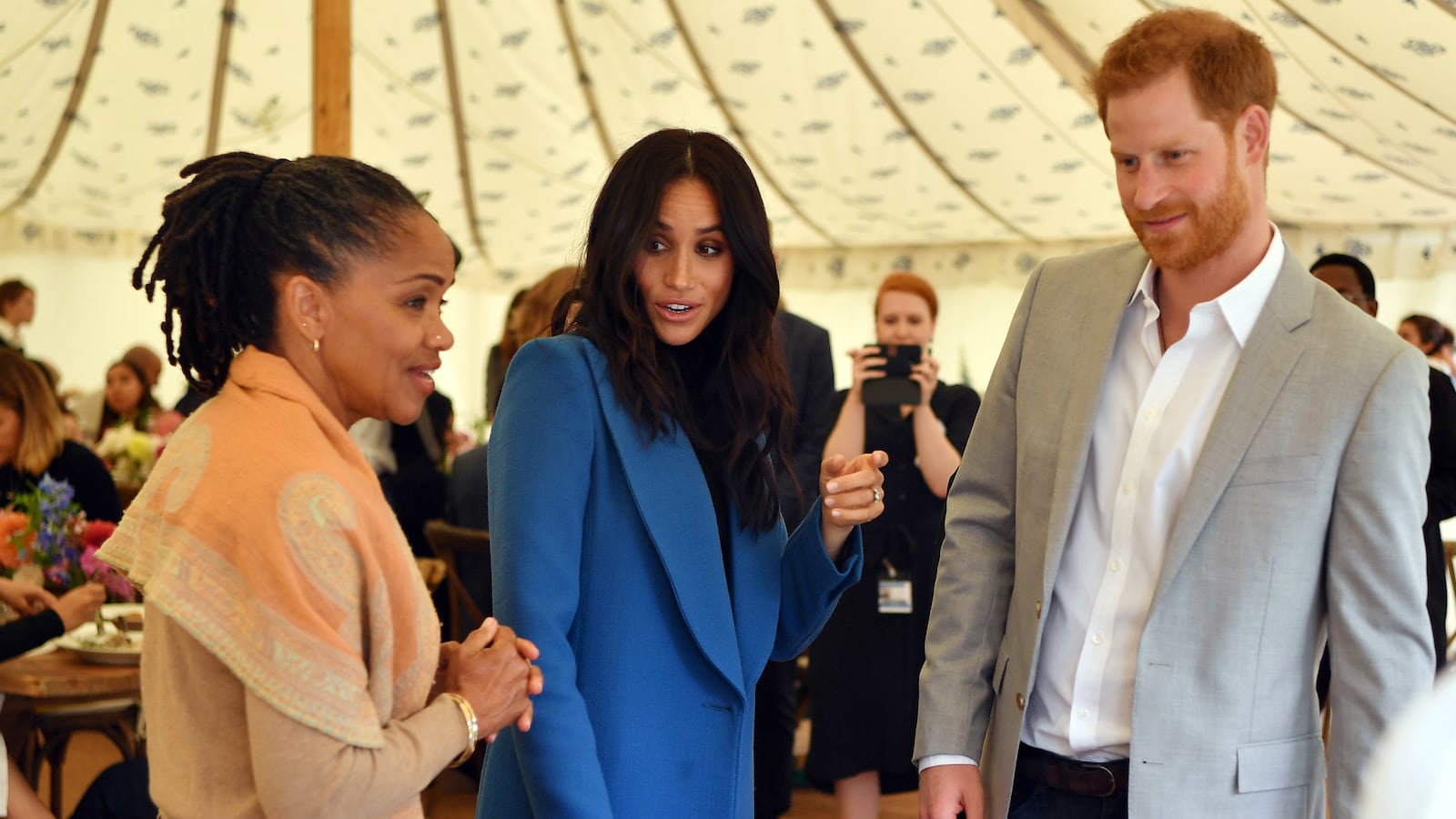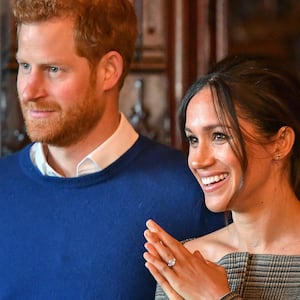If you love The Daily Beast’s royal coverage, then we hope you’ll enjoy The Royalist, an all-new members-only series for Beast Inside. Become a member to get it in your inbox on Sunday.
The messages of change are everywhere to be found in the birth of Prince Harry and Meghan Markle’s first child, but even among the many and dramatic breaks with tradition and protocol, the very public embrace of Doria Ragland, Meghan’s mother, in the heart of the royal family is an unprecedented turn of events.
Doria has been deliberately placed front and center in this narrative; the official press release announcing the birth (and who can imagine it was not personally approved by Harry and Meghan) specified: “The Duchess’ mother, Doria Ragland, who is overjoyed by the arrival of her first grandchild, is with Their Royal Highnesses at Frogmore Cottage.”
Only then did the communiqué add that Meghan and the baby were “both doing well.”
The sequencing is important. While Baby Sussex and Meghan’s mixed racial heritage is an important part of the new story of maturity that Britain is currently telling itself and others, Doria’s inclusion in the family is also significant.
Doria is the great-great-grandchild of a black man and woman enslaved in Georgia for the benefit of white humans. The woman, Mattie, was given the surname ‘Turnipseed’ by the white people who owned her. They are quite likely to have been distant relations of Prince Harry’s ancestors, or at least closely affiliated with them.
A Turnipseed is now seventh in line to the throne.
Not so long ago, the idea of any outsider, black or white, being allowed into the heart of the royal family would have been unthinkable.
Of course, the change truly began with Kate Middleton. William and Kate insisted that her parents be acknowledged and respected by the wider royal family, and the Queen, with an unerring instinct for scenting change in the air, agreed, and has invited the former air hostess and her pilot husband to join her on several high and low profile occasions.
The rest of the family swiftly dropped any lingering snobbish objections and followed suit.
It is instructive to consider that while anyone with a vague interest in the British royal family could tell you that Kate Middleton’s mother is called Carole, few would be able to name the mothers of other royal brides.
You may just about know that Diana, the most famous royal bride of all time, was the child of Frances Shand Kydd, but only the super-swots in the class would be able to identify Sarah Ferguson’s mother as Susan Barrantes, or know that Sophie Wessex was the child of Mary Rhys-Jones, a charity worker and secretary who died in 2005 (even I had to look that one up).
This is because the royal bride’s mother was excluded as a matter of principle and dogma. The woman joined the royal family, she disappeared into the life of wealth and privilege. But the hangers-on, or ‘spongers’, were assumed to be on the take, and they were left in no doubt that although they would be getting a Christmas card, a Christmas card was absolutely all they would be getting. Any attempts to cash in on their daughter’s good fortune would be stubbornly resisted.
The exclusion of the royal bride’s mother and close family fitted into a broader pattern of effectively disowning or rewriting the bride’s past to reinvent her as suitably royal.
Unfortunately, although Kate’s mother was embraced, old habits die hard, and the hostile attitude to family members persisted in the terrible way in which Pippa Middleton was abandoned by the royal family after she unwittingly became a star of the royal wedding.
Kate’s inability to secure proper protection for her sister is generally considered to have been one of the low points of the story of Kate and William. It is interesting to note how quickly Pippa got her own husband to give her brother James a job at the family estate in Scotland when his life fell apart, a wordless reproach to her sister’s impotence.
But maybe it is too much to expect the royal family to make wholesale changes all at once, and they really should be genuinely congratulated for the fact that Carole Middleton and now, apparently, Doria Ragland have both been warmly and generously embraced and included in the enfolding embrace of the royal family.
The inclusion of the mother of the bride has not been entirely smooth sailing; it has been said that Prince Charles has at times been rather jealous of the amount of time Carole gets to spend with her grandchildren, especially when it comes to Prince George.
Charles, always aware of his destiny, feels that he should have much more input into the formation of the young mind of this future king, as he is the only person who could possibly understand.
Fortunately, Kate has rejected Charles’ self-regarding views on child rearing, and seems to adhere instead to the radical proposition that the most important thing for a future king, like any little boy, is to feel loved and safe.
Grannies, as so many of us know if we have been lucky enough to be blessed with a loving grandmother, are a big part of that.
It is Carole who takes George on adventure days out, Carole who is pictured with the little boy perched upon her shoulders, Carole who occasionally picks him up from school as a surprise and takes him on special outings.
Whether or not Doria moves to the U.K. full-time, which many still believe she might, or simply comes on extended visits, it would be unwise to see the inclusion of Doria in the official press release announcing the birth of the child as anything other than a loud and clear declaration that Harry and Meghan intend for Meghan's mother to have just as important a role in the upbringing of their son as Carole has enjoyed in the upbringing of Kate and William's kids.
Indeed, Doria may have an even more important role in the life of the new baby Sussex, thanks to the extraordinary bond between her and Meghan.
In her former days as a blogger, Meghan often paid glowing tribute to her mom. Meghan also put her money where her mouth is and paid for her mother to attend graduate school after she became rich from her acting work.
Doria will certainly be a valuable and significant influence on Baby Sussex, not least because there is a huge, grandmother-shaped hole on the other side of the family—where Princess Diana should be.
The other hole, of course, is that left by the absence of Meghan’s father, Thomas.
He made a dignified statement after the birth: “I am proud that my new grandson is born into the British royal family and I am sure that he will grow up to serve the crown and the people of Britain with grace, dignity, and honour. God bless the child and I wish him health and happiness, and my congratulations to my lovely daughter Duchess Meghan and Prince Harry, and God save the Queen.”
It was a naked pitch for forgiveness.
Meghan is well aware of the intelligence and wisdom of her mother; time will tell if she gives her father a second chance.






